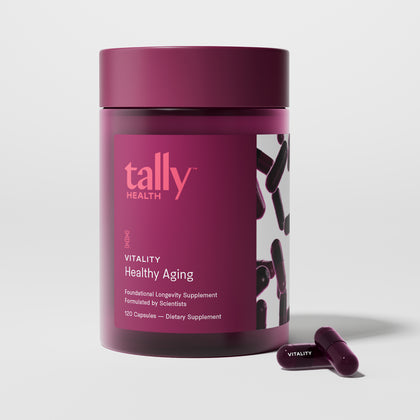

They say, “You’re only as old as you feel.” Turns out, they might be onto something.
Research suggests that how you perceive your own health is associated with how well you age. People who have a positive self-assessment of their health and a more positive outlook on aging tend to live longer [1]. Perceived health is also predictive of certain age-related health problems, such as heart disease and cancer, as well as premature death [1].
This could be because people who perceived themselves as being in good health were also more likely to adopt healthy behaviors such as exercise, a balanced diet, managing stress, and getting enough sleep. Maintaining balance in exercise routines, stress management, and daily life is essential for healthy aging. It's important to take care of our bodies by exercising, staying hydrated, and protecting our skin from the sun. What you eat can impact your appearance and energy levels as you age, so making mindful food choices matters. Drinking more water supports hydration and skin health, while avoiding cigarette smoke helps prevent premature aging. Keeping muscles active through regular exercising not only supports physical health but also benefits your brain by maintaining cognitive function. Focusing on the mind body and mind body connection promotes overall well-being. Practicing these healthy habits on a regular basis can help you feel good and feel younger. Integrating these habits into daily life helps overcome challenges associated with aging, and both older people and younger people can benefit from these positive routines.
Could it be that it’s time to stop acting your age?
Looking to understand how your perception of aging matches how you’re aging at the cellular level? Tally Health’s TallyAge Test uses a painless cheek swab to measure unique DNA methylation patterns that are influenced by health and lifestyle and change over time, revealing your body’s epigenetic age – not just how many birthdays you’ve had.
Mental Health & The Aging Process | Stress less, age better

Research suggests that older adults who perceive themselves as older may be more vulnerable to the negative effects of stress. When exposed to stressors, these individuals had a greater physiological stress response, including higher levels of cortisol and increased cardiovascular reactivity, highlighting the challenges older adults face in daily life.
One theory is that perceived age may be related to one’s sense of control over their life circumstances. Another possibility is that individuals who feel older may be more susceptible to negative emotions and stress. Experiencing positive emotions more frequently can help buffer the effects of stress and promote better mental health as we age. So, don’t stress about getting older, and don’t let stress make you feel older!
Integrating mindfulness meditation into daily life can help manage stress and promote a positive outlook as we age.
Mind over Matter for Aging Adults
Did you know that your subjective age (how old you feel) could also play a role in inflammation? One study found that participants who reported feeling older than their actual chronological age had higher levels of IL-6 compared to those who felt younger than their actual age, and these individuals tend to feel younger both physically and mentally. This association was not explained by other factors that could influence IL-6 levels, such as age, sex, body mass index, or health behaviors. Physical activity, in particular, plays a significant role in supporting healthy aging and reducing inflammation. Other studies have also found similar associations between subjective age and health outcomes [2].
The Power of Social Connections as We Age

As we move through the aging process, one of the most powerful tools for maintaining mental health and overall well-being is the strength of our social connections. For older adults, meaningful relationships with family, friends, and the community are more than just a source of joy—they are a cornerstone of positive aging and a positive attitude toward life.
Research shows that older adults who nurture strong social ties tend to experience greater life satisfaction, personal growth, and mental well-being. These connections help foster a positive mindset, making it easier to embrace new experiences, learn new things, and stay mentally active. In fact, several studies have found that regular social interaction can help maintain cognitive functioning and even lower the risk of cognitive decline and dementia.
But the benefits of social connections go beyond the mind—they have a real impact on physical health, too. Engaging with others can motivate older adults to stay active, participate in regular exercise, and make healthier lifestyle choices, such as eating a healthy diet and staying hydrated. These habits contribute to improved blood flow, healthier skin cells, and a stronger body overall. Feeling younger and more connected isn’t just a state of mind; it can translate into years younger in terms of physical health and vitality.
Social connections also play a crucial role in combating the harmful effects of stress and negative stereotypes about aging. By surrounding themselves with supportive, positive people, older adults can develop resilience, reduce stress, and maintain a sense of purpose. This positive environment helps counteract the negative messages that can sometimes accompany old age, empowering older adults to focus on the opportunities and benefits that come with each new stage of life.
From a public health perspective, the importance of social connections cannot be overstated. Older adults who are socially isolated face a higher risk of developing chronic diseases, including dementia, while those who maintain strong relationships are more likely to enjoy successful aging and lead active, fulfilling lives. For example, research from the University of California has shown that older adults with robust social networks have better cognitive functioning and a lower risk of dementia. Similarly, the National Institute on Aging highlights social connections as a key factor in reducing the risk of age-related diseases.
Maintaining these connections doesn’t have to be complicated. Whether it’s volunteering, joining a club, participating in group exercise, or simply keeping in touch with loved ones through phone calls or video chats, there are countless ways to stay engaged. Even small, daily interactions can make a big difference in how young and vibrant we feel.
In the end, prioritizing meaningful connections is one of the most effective ways to support both mental and physical health as we age. By making time for relationships and staying involved in the community, older adults can maintain a sense of purpose, keep their minds sharp, and enjoy a more positive, fulfilling experience of aging. As research continues to show, staying socially connected is not just good for the soul—it’s essential for successful aging and a long, healthy life.
You’re in control of feeling younger

Researchers have found that people who feel a greater sense of control over their health tend to have better physical function and a lower risk of chronic diseases. This sense of control can come from factors such as knowledge about health and wellness, social support, and a sense of purpose in life [3].
Accessing reliable resources for health and wellness information is essential to support informed decisions and ongoing well-being.
At Tally Health, we want to give you the knowledge, support, and tools you need to change the way you age, for good. Our personalized Action Plans, a part of our TallyAge Test results, help you tackle everything from eating healthier and increasing social satisfaction to managing stress. Enhancing your sense of purpose can also be achieved by contributing to your community, which can bring greater fulfillment in later life.
How is perceived health linked to aging outcomes?
People who have a positive self-assessment of their health and a more positive outlook on aging tend to live longer. Perceived health is also predictive of certain age-related health problems, such as heart disease and cancer, as well as premature death.
What happens when older adults perceive themselves as older?
Older adults who perceive themselves as older may be more vulnerable to the negative effects of stress, including higher cortisol levels and increased cardiovascular reactivity.
How does subjective age relate to inflammation?
Participants who felt older than their chronological age had higher levels of IL-6, a marker of inflammation, compared to those who felt younger—regardless of other factors like age, sex, BMI, or health behaviors.
Recommended Supplements
Citations
[1] Levine ME, Lu AT, Quach A, Chen BH, Assimes TL, Bandinelli S, ... & Ferrucci L. (2015). An epigenetic biomarker of aging for lifespan and healthspan. Psychology and Aging, 30(4), 818-826.
[2] Goldberg, P., Gueguen, A., Schmaus, A., Nakache, J. P., & Goldberg, M. (2001). Longitudinal study of associations between perceived health status and self-reported diseases in the French Gazel cohort. Journal of Epidemiology & Community Health, 55(4), 233-238.
[3] Hausdorff, J. M., Levy, B. R., & Wei, J. Y. (1999). The power of ageism on physical function of older persons: Reversibility of age-related gait changes. Journal of the American Geriatrics Society, 47(11), 1346-1349.
[4] Levine, M. E., Cole, S. W., Weir, D. R., & Crimmins, E. M. (2015). Childhood and later life stressors and increased inflammatory gene expression at older ages. Social Science & Medicine, 130, 16-22.
[5] Lachman, M. E., & Weaver, S. L. (1998). The sense of control as a moderator of social class differences in health and well-being. Journal of Personality and Social Psychology, 74(3), 763–773.











